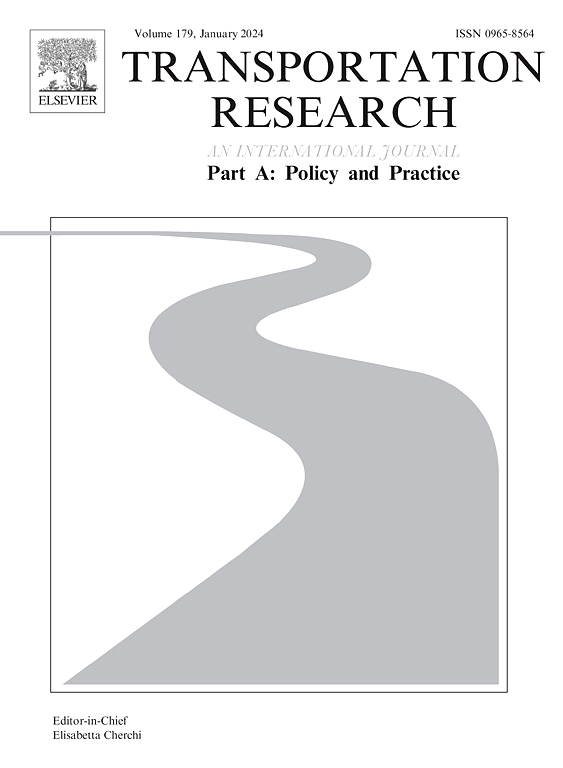通过可解释的机器学习解码航班延误下的旅行行为意图:保护乘客机动性的见解
IF 6.8
1区 工程技术
Q1 ECONOMICS
Transportation Research Part A-Policy and Practice
Pub Date : 2025-09-18
DOI:10.1016/j.tra.2025.104666
引用次数: 0
摘要
了解乘客在航班延误情况下的行为对于制定积极的政策以减轻航班延误引起的不利影响至关重要。为了支持更有效和前瞻性的干预措施,本研究在北京大兴国际机场(BDIA)进行了一项联合显示偏好和陈述偏好(RP-SP)调查,以分析延误出行的出行行为意图。采用极端梯度增强(XGBoost)模型分析了出行选择变化与一系列解释变量之间的关系,包括社会人口统计学属性、出行特征、机场感知服务质量和延误场景特征。结果表明,社会人口学属性(如工作类型、年龄)和旅行特征(如票价)在解释旅行行为意图方面具有较高的相对重要性。因此,有必要针对不同行为意向的旅客群体实施差异化的服务策略。此外,研究结果还表明,空间变量对行程取消很重要,并强调了在服务不足的地区,在航班中断期间扩大高速铁路作为替代方案的重要性。通过识别关键决定因素,并通过机器学习(而不是传统的计量经济学模型)对其在解释乘客行为变化中的重要性进行排序,本研究通过为用户分析驱动的航班延误服务策略提供实用框架,推进了中断管理。它还通过实施预期和差异化的政策干预措施,为机场/航空公司优化资源配置提供信息,以提高运营弹性,为未来的中断做好准备。这些见解有助于确保被延误的乘客能够顺利完成行程,或顺利调整出行选择,并提供符合个人需求的服务,最终提升整体旅行体验。本文章由计算机程序翻译,如有差异,请以英文原文为准。
Decoding travel behavioral intentions under flight delays via interpretable machine learning: Insights for safeguarding passenger mobility
Understanding passenger behavior under flight delays is crucial for developing proactive policies that mitigate disruption-induced adverse effects. To support more effective and foresighted interventions, this study conducted a joint revealed preference and stated preference (RP-SP) survey at Beijing Daxing International Airport (BDIA) to analyze travel behavioral intentions in delayed trips. An Extreme Gradient Boosting (XGBoost) model was employed to elucidate the relationships between travel choice shifts and a set of explanatory variables, including socio-demographic attributes, travel characteristics, perceived service quality at the airport, and delay scenario features. The results show that socio-demographic attributes (e.g., work type, age) and travel characteristics (e.g., ticket price) hold higher relative importance in interpreting travel behavioral intentions. It is therefore necessary to implement differentiated service strategies tailored to passenger groups with different behavioral intentions. Also, findings reveal that the spatial variable matters in trip cancellation and highlight the importance of expanding high-speed railway as an alternative during flight disruptions in underserved regions. By identifying key determinants and ranking their importance in interpreting passenger behavior changes via machine learning instead of traditional econometric models, this study advances disruption management by offering a practical framework for user profiling-driven service strategies against flight delays. It further informs the airport/airline operators in optimizing resource allocation by implementing anticipatory and differentiated policy interventions towards higher operational resilience in preparation for future disruptions. The insights help ensure that delayed passengers can complete their trips successfully or make smooth adjustments to travel choices, supported by services that align with individual needs and ultimately enhance the overall travel experience.
求助全文
通过发布文献求助,成功后即可免费获取论文全文。
去求助
来源期刊
CiteScore
13.20
自引率
7.80%
发文量
257
审稿时长
9.8 months
期刊介绍:
Transportation Research: Part A contains papers of general interest in all passenger and freight transportation modes: policy analysis, formulation and evaluation; planning; interaction with the political, socioeconomic and physical environment; design, management and evaluation of transportation systems. Topics are approached from any discipline or perspective: economics, engineering, sociology, psychology, etc. Case studies, survey and expository papers are included, as are articles which contribute to unification of the field, or to an understanding of the comparative aspects of different systems. Papers which assess the scope for technological innovation within a social or political framework are also published. The journal is international, and places equal emphasis on the problems of industrialized and non-industrialized regions.
Part A''s aims and scope are complementary to Transportation Research Part B: Methodological, Part C: Emerging Technologies and Part D: Transport and Environment. Part E: Logistics and Transportation Review. Part F: Traffic Psychology and Behaviour. The complete set forms the most cohesive and comprehensive reference of current research in transportation science.

 求助内容:
求助内容: 应助结果提醒方式:
应助结果提醒方式:


